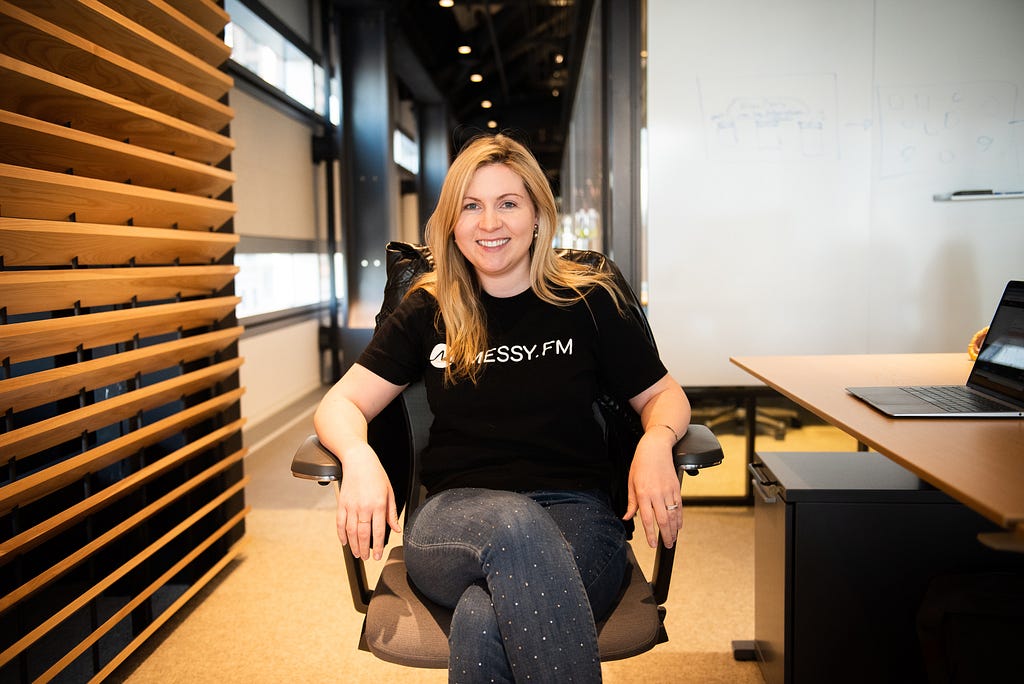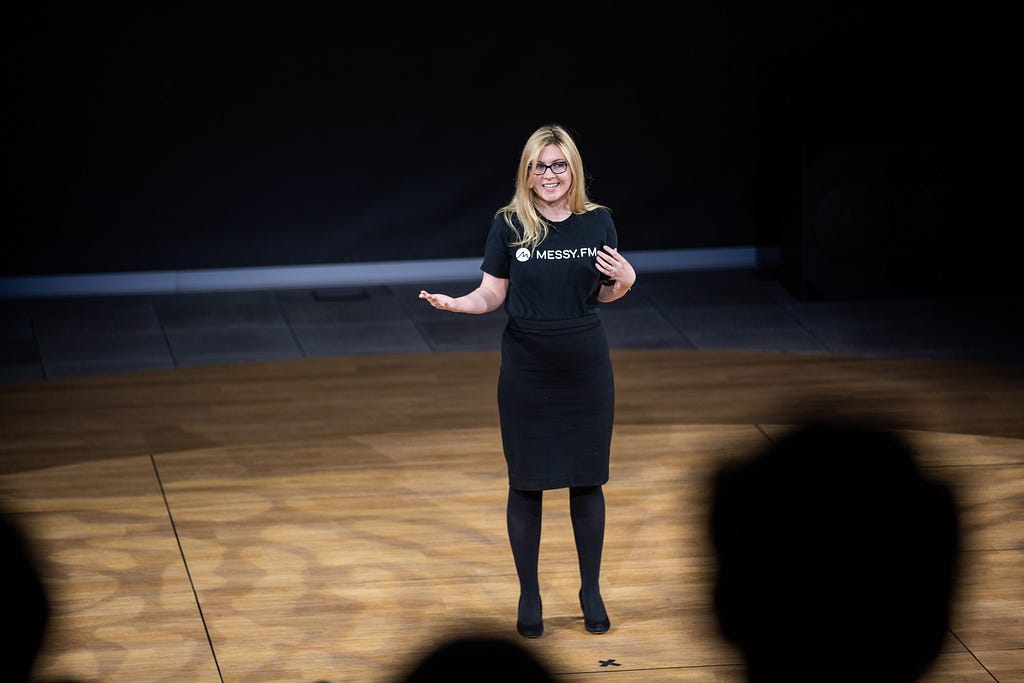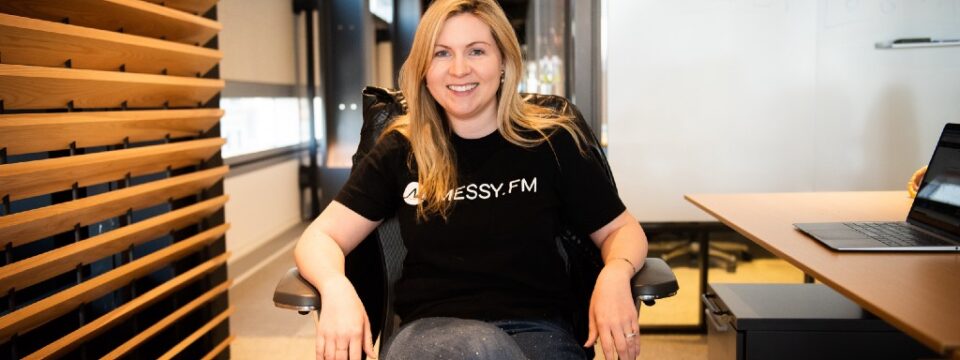Inspirational Women Leaders Of Tech: Molly Beck Of Messy.fm On The Five Things You Need To Know In Order To Create A Very Successful Tech Company

… For a financially successful company, the only thing needed is SALES. Sales tell you if your idea works, and the best form of capital is customers. A good tech company improves products constantly, works on culture, and endlessly focuses on hiring and teamwork. A great company has all of these things, plus sales.
We had the pleasure to interview Molly Beck. Molly is the CEO of Messy.fm. Messy.fm’s business software empowers organizations to create podcasts in minutes. Leaders and teams from top enterprise, government, and university sectors, plus thousands of small business owners and entrepreneurs, trust Messy.fm to power their podcasting content. Beck is also the author of Reach Out (McGraw-Hill), a member of the National Small Business Association’s Leadership Council, and a 2022 Tory Burch Fellow.
Thank you so much for joining us in this interview series! Before we dive in, our readers would love to learn a bit more about you. Can you tell us a story about what brought you to this specific career path?
Thanks so much for interviewing me — I am thrilled to be here.
The decision to start a blog in the 2000s shaped my professional life in many ways. And when I saw podcasting replacing blogging in the mid-2010s, I wanted to again be an early adopter and jump in on the new medium. I first moved into the podcasting space by building a podcast network within Forbes called Forbes Podcasts. And when that venture was merged with industry leader PodcastOne after we smashed audience listening goals, I started thinking about my next step. I decided in the podcasting revolution to be a technology owner; instead of a content creator like I was in the blogging revolution. So I left Forbes to start Messy.fm, a complete end-to-end podcasting software.
Can you share a story about the funniest mistake you made when you were first starting? Can you tell us what lesson you learned from that?
I was emailing our first big customer, going back and forth solving their issue about a bug in the software. As we had finally resolved the problem, I meant to end my last email in the chain to them with: “please don’t hesitate to reach out.” Instead I sent, “please hesitate to reach out.” I got better at proofreading after that.
Can you tell us a story about the hard times that you faced when you first started your journey? Did you ever consider giving up? Where did you get the drive to continue even though things were so hard?
We were initially a B2C company that focused on podcasting software for solo creators, but it became harder to compete in the B2C podcasting market as other entrants came in. So, we started to dig into what segments of our current users were getting the most unique value from our software, and we discovered it was almost exclusively companies and organizations. We then pivoted to start building features focused on podcasting at work, and as we saw revenue increase, we leaned in hard on serving those customers to keep growing. Now, four years later, we are the leader in work podcasting software.
Can you please give us your favorite “Life Lesson Quote”?” Can you share how that was relevant to you in your life?
I’ve always loved the Paris Hilton quote, “The only rule is don’t be boring.” To me it applies to business decisions, in my hobbies, in my personal life…. I always like to keep things interesting and fun.
Ok super. Thank you for all that. Let’s now shift to the main focus of our interview. We’d love to learn a bit about your company. What is the pain point that your company is helping to address?
Hybrid workplace environments require new internal communications solutions in mediums that employees already enjoy outside of work….…like podcasts! Most Americans are now podcast listeners. Our software makes it easy for leaders and teams to create audio content to reach their employees, customers, and stakeholders in 15 minutes or less.
What do you think makes your company stand out?
There are many tools in the Messy.fm software that our customers love. Some of our most-loved features include our in-app recorder, online editing studio, and our extensive exclusive music library. Also, employees can listen to their organization’s internal podcasts without downloading new apps or remembering additional passwords, thanks to our seamless Single-Sign-On integrations.
Something else we are proud of is being a Women’s Business Enterprise-certified Women-Owned Small Business. Receiving the certification has opened many doors for us to work with customers who desire to support under-represented business founders like me, by working with vendors like Messy.fm.
Are you working on any exciting new projects now? How do you think that will help people?
We just launched a great Super Admin feature for large enterprises to have visibility into all the internal podcasts produced by their company — so far the response has been terrific.
Let’s zoom out a bit and talk in more broad terms. Are you currently satisfied with the status quo regarding women in tech? What specific changes do you think are needed to change the status quo?
I would love to see more discussion about the different paths available to finance your company. The narrative seems to be either bootstrap and max out your credit cards (this is generally lousy advice to follow), OR raise from venture capitalists and try to be part of the 2% of women who get VC funding (this is generally hard to obtain for the other 98%). I would love to see more emphasis within the startup tech ecosystem on keeping costs low, starting your venture as a side hustle, using grants and accelerators to launch MVPs, and other financing options outside of credit cards and VCs. The book Build the Damn Thing had a great discussion around different financing options.
In your opinion, what are the biggest challenges faced by women in tech that aren’t typically faced by their male counterparts? What would you suggest to address this?
A silver lining of the past few years of the pandemic is the rise of Zoom culture. For anyone with caretaking responsibilities, it is much easier to schedule meetings when you don’t need to travel to be there in person. Taking meetings over video conferencing instead of expecting you to be there in person has made it so much easier for parents like me to scale our companies effectively without losing tons of precious time to airplanes.

What would you advise to another tech leader who initially went through years of successive growth, but has now reached a standstill. From your experience do you have any general advice about how to boost growth or sales and “restart their engines”?
Something that has always helped me whenever I feel a little plateau in any area of my life — business, sales, parenting, etc.- is to dive deeply into books about the topic. I like to choose three books on the area I am stuck at (it can be as simple as just going to the library and asking, “what are the top three books on XYZ?”) and then read them. You could do a similar thing with podcasts — choose three popular episodes on the topic you are struggling with, and listen to them. I find that three is a good number because each expert will come at the work from a slightly different point of view — and consuming three different perspectives always gives me a few new ideas to try to jump over the standstill.
Based on your experience, can you share strategies to give your customers the best possible user experience and customer service?
To provide a good customer experience, I have found it is a combination of three things:
● Face-to-face conversations: talking directly to your customers on a regular (at least quarterly) basis
● Anonymous surveys: sending out questionnaires to customers asking for feedback anonymously
● Website data: looking at the data on your site to uncover insights about the customer journey and how they are using the product in ways you might not even be aware of
Taken holistically, all three together can give you a robust view into your customers’ engagement with your product, making it easy to turning that data into actionable steps to improve UX and customer service.
Based on your experience and success, what are the most important things one should know in order to create a very successful tech company?
For a financially successful company, the only thing needed is SALES. Sales tell you if your idea works, and the best form of capital is customers. A good tech company improves products constantly, works on culture, and endlessly focuses on hiring and teamwork. A great company has all of these things, plus sales.
Some resources that have helped me with sales:
● Taking a course on sales and pricing at Northwestern. (This is the course for those interested).
● Being a student of sales books and podcasts, following the “method of reading or listening to the top three” described above.
● Hiring a sales coach — following the advice of one of my investors, I met several times with a sales coach who helped me refine my sales materials and also helped hire my first SDR rep.
Again — the best form of capital is customers!
We are very blessed that very prominent leaders read this column. Is there a person in the world or in the US with whom you would love to have a private breakfast or lunch, and why? They might see this if we tag them 🙂
I admire how Okta built their enterprise identity platform. The co-founder’s latest book Zero to IPO was one of my favorite 2022 reads. So, I’d love to connect with Frederic Kerrest!
Thank you so much for this. This was very inspirational, and we wish you only continued success!
Inspirational Women Leaders Of Tech: Molly Beck On The Five Things You Need To Know In … was originally published in Authority Magazine on Medium, where people are continuing the conversation by highlighting and responding to this story.
